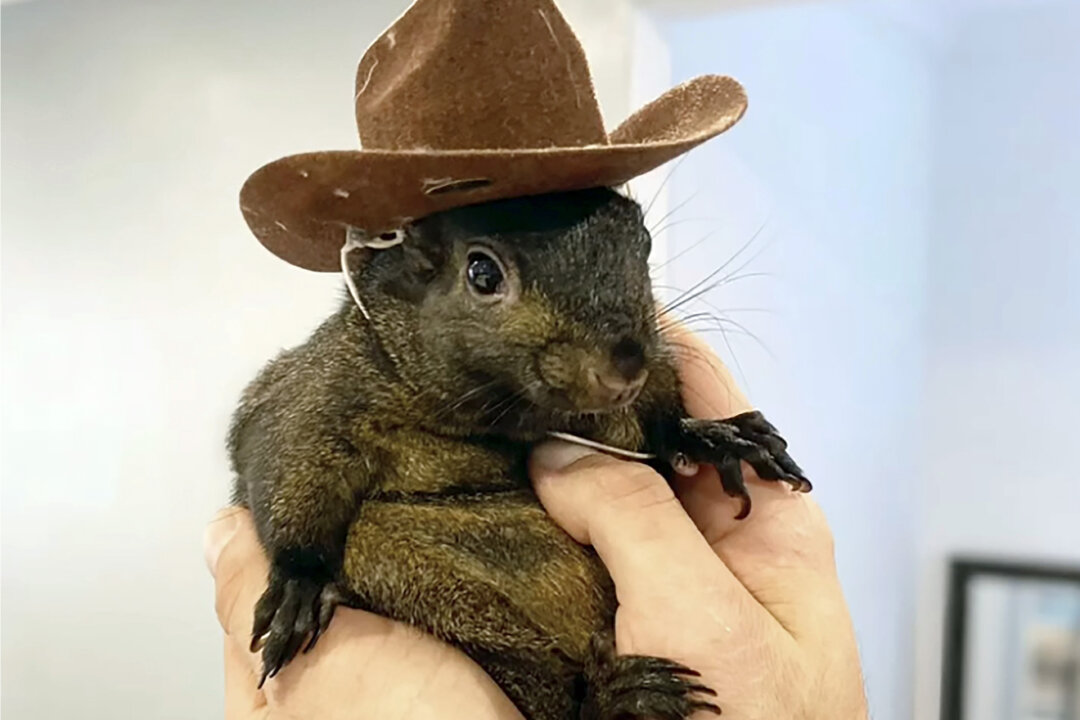https://www.theepochtimes.com/opinion/the-martyrdom-of-pnut-the-squirrel-5753748
By Jeffrey A. Tucker
11/6/24
NOTE: When reading at the Epoch Times, either use your browser's "reader mode", OR disable javascript using a free add-on or pluginExcerpts:A squirrel named Peanut, also known as P'Nut, was rescued as a tiny baby in New York City, nursed to adulthood, and implausibly domesticated as a house pet by a couple living in Connecticut. The couple took in another pet, a raccoon named Fred, who similarly became a beloved member of the household. Then, with the revenue the couple earned from social media fame, they moved to New York state to start a licensed animal rescue service.
Alerted to their story, New York authorities somehow obtained a warrant from a judge to search the couple’s home and seize the animals. The invasion lasted five hours, and the home was torn apart as the couple was forced to wait outside. Fred and Peanut were seized and then, shockingly, euthanized for fear of rabies, even though there was no evidence in either animal.
Surprisingly, the incident has gone viral. As they say, cometh the hour, cometh the hero. A squirrel and a raccoon have emerged as mighty symbols of the excesses of public health. A profession born a century and a half ago, with a mandate to clear the water and streets, has become a wicked hegemon imposing itself on every aspect of human life.
The story caught on with the public because it illustrates the problem with an expansive vision of the public health mandate. Once a government declares that it has arbitrary power to control infectious disease, it is implicitly claiming mastery over the entire microbial kingdom and everything in it.
More than a century ago, the same state government was on the hunt for typhoid carriers, and found a poor Irish immigrant named Mary Mallon, who was a cook. Though she carried no symptoms, cases of typhoid seemed to follow her. She was hardly tnche only carrier, but the drive to isolate her, take away her job, and cut her open became a fanatical campaign.
[...]
Mary’s story came alive again in 2020 and following, during the war on a virus, a respiratory infection that spread even to animal and mutated quickly. Containment was impossible, but that did not stop authorities from shutting down economic life in most nations of the world.
Four and a half years later, we’ve still not had a public reckoning for what happened, even though the signs of damage are all around. Lifespans have been shortened, not because of the virus but rather because of the response, along with inflation, learning losses, and the collapse of health generally. The result was a classic case of reverse consequences: In the name of protecting health, the opposite happened.
The much-needed reckoning that has not happened is leaking out in other ways: loss of public trust in institutions, political anger and upheaval, and the valorization of martyrs, of whom there are many. But even with possibly millions of people injured by the COVID-19 shots, the stand-in symbol for them all has become an innocent squirrel and the right of a humane couple to show care for the little creature.
Such stories cannot be scripted. They emerge and seize the public mind in ways that defy elite intentions, and the phenomenon defies every possibility of prediction. It was this way with the Boston Tea Party as well as Rosa Parks’s refusal to sit in the back of the bus. But the phenomenon of a martyr for a cause that ends up galvanizing social change goes back to the ancient world
[...]
Speaking of science, one does wonder how, in its present form, it survives as the official faith of our age, in light of all that has transpired over these past few years. Peanut the Squirrel was sacrificed in the name of science and public health, same as so many others, along with institutions and businesses built over so many years. This calamity will not be forgotten, and the story of this simple squirrel and humble raccoon could become the lesson that unravels the entire project.
This event unfolded over a weekend in which I was otherwise engaged in moderating panels and discussions on the problem of overweening state power in health, medicine, economics, and education. Hence, I paid no attention to media goings-on.
Emerging on the other side of our conference, I found that popular culture had made the point I had been making all along: The excesses of public health are deeply intrusive, and threaten the normal freedoms and rights a civilized people expect. It just so happens that this one story went “viral” and clarified the important issues in ways no article ever could.
Requiescat in Pace, Peanut the Squirrel and Fred the Raccoon. May their deaths affect the multitudes in the same way their lives touched those who were blessed to know them.
More at URL above...